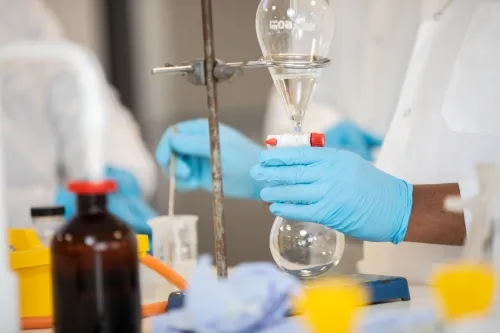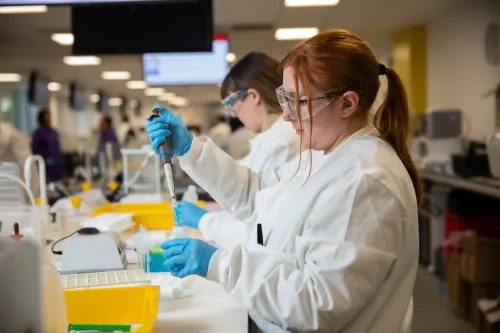We are very proud of the hard work our lab technicians and academics have done to attained Bronze LEAF accreditation and make research more sustainable! Not only are we looking forward to seeing them progress to Silver and Gold levels but also seeing our other university labs follow in their footsteps.

LEAF stands for Laboratory Efficiency Assessment Framework and aims to make labs run more efficiently. This ultimately makes them more sustainable, through things such as better energy and resource use and handling waste effectively. Thanks to Dr Matt Jones, Lecturer in Biomedicine, The University of Salford is actively engaging in the programme to make our labs more sustainable.

Whist we are committed to contributing research that supports a more sustainable and environmentally conscious society, LEAF helps ensure we are conducting our research sustainably too. As signatories of the Concordat for the Environmental Sustainability of Research and Innovation, we have demonstrated a commitment to research that improves and enhances sustainability whilst not working to harm our planet in the process.
LEAF so far
Lab technicians Dr Nicky Morgan and Dr Adam Sharples have worked with academic Matt Jones in making Bodmer Lab a Bronze LEAF Lab. One of the highlights from the work toward gaining LEAF accreditation is the making of metal spreaders, with the help of Michael Clegg at MakerSpace.

Spreaders are instruments used within microbiology to distribute microbes across surfaces to allow them to grow and experiment on. Single use spreaders, made from plastics (which also come wrapped in plastics), are widely used in labs but are discarded after use. With Adam and Nicky’s work in making reusable metal ones, it’s estimated that around 9.5Kg of waste can be saved each term. That’s about an adult koala’s weight of plastic being saved from ending up in landfill. By using these spreaders again and again, the amount of plastic saved over a year and more really adds up.
Cara Tobin has worked hard to make David Collins Suite a Bronze LEAF lab. It is great to now have our Sustainability Masters students working in a lab that has gained a internationally recognised sustainability credential.
These changes are just the beginning as we aim for higher levels of LEAF accreditation, and to support other labs to take bigger and bolder sustainable actions.

How can you help to support LEAF and sustainable labs and research?
If you’re working in a lab, either for your practical’s or for research, think about how you conduct your experiments. By familiarising yourself beforehand with the practical steps and protocol, you can have more confidence in your method, which can mean less mistakes and less waste.
You can also think about the resources you’re using. How many times do you need to run a test and what are the most sustainable materials you can use? Challenging yourself to take a count of the amount of single use materials you’ve used in an experiment can illustrate the amount of waste which comes from some testing.

Look at how you handle your lab waste too. Waste is an inevitable part of science and experiments. After looking at how to reduce your waste, material use which can’t be avoided should be treated properly to reduce their environmental impact. Look for waste labels around the lab to make sure waste is going to the right places. If you’re unsure, just ask!
If you’re an academic, as well as making your research sustainable, you can integrate sustainability into your teaching, showcasing the best practice to take which considers sustainability and the environment. Look at how practical’s are run. Do they use the most sustainable materials and resources, or could they be adapted and restructured? Are the processes and systems being shown also the most sustainable methods, or is there another way to do tests which are better for the environment?
Visit our Be Sustainable webpage to find out how to get involved